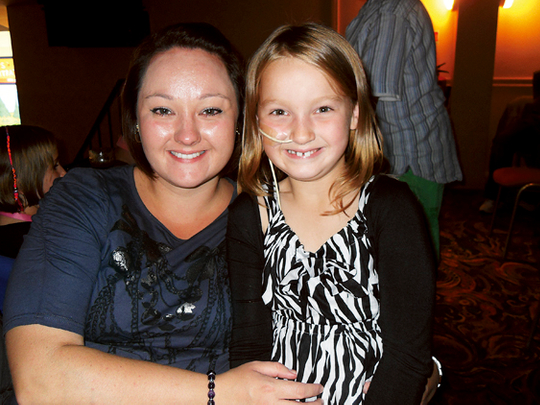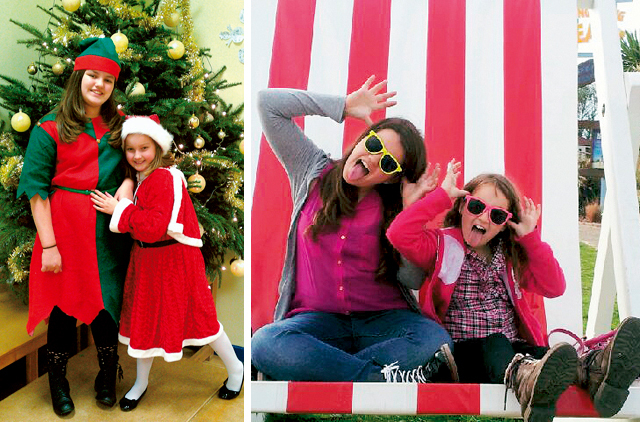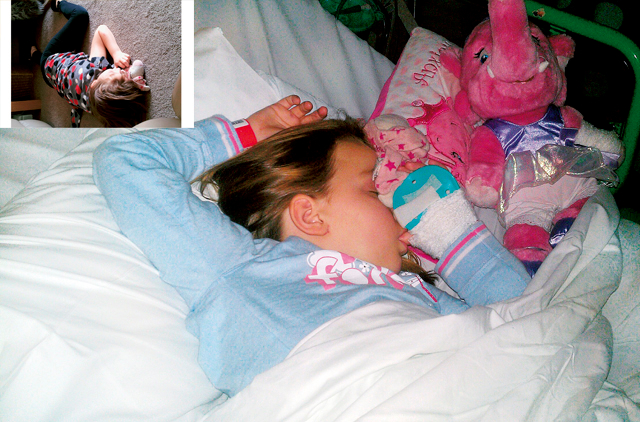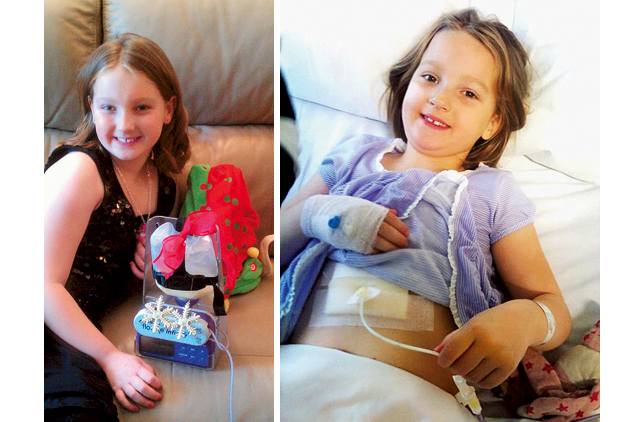
For most children Christmas is when they’re allowed to indulge in all their favourite treats. However, for Evie Gormley, the festive food is less than jolly because she is allergic to nearly everything she eats or drinks.
The nine-year-old suffers from a rare condition that means eating even the smallest morsel of the wrong food leaves her writhing in agony with stomach ache. Evie can never enjoy a normal meal, eat party foods like her friends and certainly won’t be eating Christmas pudding this festive season – or ever.
It took doctors four years to diagnose Eosinophilic Colitis, an extreme allergic disorder, which leaves her suffering from a severe rash and extreme fits of vomiting and diarrhoea. In that time her weight plunged, she developed a food phobia and her mother, Emma, was even accused of making up her youngest daughter’s illness to gain attention.
“It’s been awful,” Emma, 33, says. “When Evie was a baby there were times she would cry for 20 hours a day. I found it so difficult to deal with. I knew something was wrong but had no idea it would be this serious. “As you can imagine, Christmas is especially hard for her as she feels she is missing out on festive goodies.
Every mother wants her family together at Christmas, enjoying themselves. But for the last two Christmases, while we all sat down to enjoy the full traditional meal with all the trimmings, Evie just watched us. It was heart breaking.” At first, Emma put her baby’s problems down to her premature birth.
“She was three weeks early following a road accident I had when my car collided with another and I sustained severe whiplash down one side of my body. I was taken to hospital because my blood pressure rocketed, which caused me to go into labour. The labour was quick – only four minutes – but tricky because the whiplash caused my hips and back to go into spasms. I went into shock after the birth even though Evie came out unscathed.”
In hospital, baby Evie refused to feed for the first 24 hours and cried continuously. When she did eventually take her mother’s milk she started vomiting and having diarrhoea, often up to 20 times a day. “The midwives felt it was probably due to a stressful natural birth and I was reassured she would settle,” Emma says.
She was allowed to take Evie to her Bedfordshire home in the UK, but was worried because she didn’t improve. She began a constant round of visits to the doctor and health visitor and was told it was colic, because the baby was premature, and enjoyed attention, but Emma wasn’t convinced.
“At her six-week check up we discovered she had lost so much weight. She was 3.5kg at birth and went down to 2.9kg so the GP felt she may have reflux and started her on medication. But her crying, sickness and diarrhoea continued and her weight was erratic. “She is my second daughter – my eldest Ellena is now 11 – so I knew it wasn’t normal behaviour and continued to seek advice from my GP and health visitor.
After three months of Evie’s continuous crying and little sleep I went back to my health visitor yet again. This time seeing how worried I was, he had Evie admitted to the local hospital. “She was classed as a ‘failure to thrive’ baby and put on a saline drip to rehydrate her. I had to stop breast feeding and a hypoallergenic formula was started. After five days we were discharged and her reflux medication was increased. She was still vomiting and had diarrhoea but it had eased slightly.”
No end to Evie’s pain and discomfort
Evie slowly started gaining weight but her symptoms persisted. The following week she had a pH study done to test the acid activity in her stomach over 24 hours. “They placed a probe up her nose and then down into her stomach to measure the acid activity in her stomach over a 24-hour period while eating, digesting and at rest. But we still didn’t get a proper diagnosis.”
Over the next months Evie didn’t put on any weight, and her symptoms continued although she reached all her milestones, and began to toddle and babble. “She wanted to join in with everyone else,” Emma says. “But sometimes the pain in her stomach, back, head and joints was just too much so she would have to spend days on the sofa.” By the age of two, Evie refused to eat of her own accord as she associated food with pain, rashes, sickness and diarrhoea.
She began running away from the dining table, screaming, and developed a food phobia. As a result her weight fluctuated. “There were occasions when she lost weight,” Emma explains. “One of the worst episodes was when she was three years old and she lost 3.6kg in ten days.” Evie would sometimes have to go to the toilet three times during one meal.
In the meantime Evie was also diagnosed with severe eczema and had various different creams, ointments, and wet wraps, which helped a little. She also continued to be seen by specialists who still hadn’t diagnosed her food problem. “I was told she was a fussy eater, had toddler diarrhoea, was an attention seeker... it was even implied that I enjoyed the attention,’’ says Emma. “Unbelievably the health authorities sent an expert over to make smiley faces out of her dinner in order for her to eat it.
How wrong could they be? “Then a paediatrician said she felt the problems were due to me and insinuated I had Munchausen by Proxy Syndrome – where parents exaggerate or make up a child’s illness to get attention for themselves. I was so upset I went to my GP and asked to see another paediatrician.
“Luckily this time the new paediatrician looked over Evie’s notes, spotted abnormalities in her pH test and referred us to Great Ormond Street Hospital in London.” A few weeks later Evie was admitted for a colonoscopy and endoscopy where biopsies were taken and she was finally diagnosed with Eosinophilic Colitis.
It’s due to over-production of eosinophilic cells – a particular type of white blood cells – in the colon, small and large bowel. Evie’s body was fighting itself and rejecting food as it thought it was the enemy. “I was so relieved I cried,’’ says Emma. “Finally Evie’s suffering would ease. It was if a huge burden was lifted off my shoulders.”
The little girl started daily medication and was put on anti-inflammatory drugs to reduce the inflammation in her bowel, guts and joints, mast cell – tissue cell of the immune system – blockers to help reduce the production of mast cells and eosinophils in her blood and digestive system and antihistamines because she’d developed allergies to grass, pollen, flowers, animals and dust to name but a few.
She continued to take her reflux medication and follow a dairy-free diet. It helped but it didn’t stop her symptoms and daily discomfort. Emma says Evie tried to have a normal life. “She went to school but her attendance was poor and she struggled to join in. She would have a short nap in the library at lunchtime and stayed in most playtimes to rest. She rarely participated in PE. Weekends would be spent resting and Evie would sometimes come home from school and go straight to bed.”
Helped by space-age technology
In January 2010, when she was seven years old, Evie was fitted with a nasogastric tube – which is passed through her nose and down through her nasopharynx and oesophagus into her stomach – and started an elemental formula-only diet only taking water orally. Emma says, “Elemental feed is a pre-digested formula which is already broken down with only the vitamins and nutrients that the body needs so there’s no waste. It was invented for astronauts in space.”
The pump was supposed to be in for six weeks to allow her gut to repair itself but it went on for three months before Evie was allowed to try food again. “For the first week she was allowed potatoes only; the second week she tried rice and each week after we tried to get Evie to try different foods to see if she had any reaction to them. During his time we found Evie had numerous food allergies and intolerances,” says Emma, a single mother.
“While on formula only, Evie thrived both physically and mentally as her symptoms eased and she was able to sleep through the night. She enjoyed joining in activities with her friends that she had previously missed out on due to pain or fatigue. Her school friends accepted her feeding tube and backpack she wore carrying her feed and pump. She would explain she had ‘special spaceman milk’. “I never thought I’d see her like this, it was such a relief.”
While Evie was eating small amounts orally it was not enough to sustain her so she was supported with the feed. After nine months she was fitted with a permanent feeding tube into her stomach. She would have her feed on all day and was able to play outdoors with her friends as her energy levels soared. It continued until July this year, when it was stopped to try to encourage Evie to eat more orally.
She continues on a very restricted oral intake. Her main allergies that doctors know about are nuts, wheat/gluten, dairy, sesame, tuna, strawberries, kiwi and pineapple but they keep discovering more when she has reactions they are unable to pinpoint. She has a list of food intolerances as well as the allergies, meaning she struggles to eat from a menu, pick up a snack while out, have pizza or ice cream like her friends.
Emma says, “She would live on chips and crisps! But ready salted crisps though, as all flavoured crisps contain milk or wheat and gluten.” Evie carries a lunchbox of safe foods wherever she goes. “We always have a box of safe food and medication – including an EpiPen, in case she has a severe reaction or anaphylactic shock,” says Emma. “Evie is anaphylaxis to a list of nuts, which is a major problem.
She’s had a reaction in the cinema where her lips and face have swollen up after she touched a seat that was earlier used by a person who ate nuts. We daren’t go anywhere without the EpiPen. “Figures for people suffering from Eosinophilic Colitis are not known but when Evie was diagnosed I was told by doctors she was one of 300 known in the world. “For now she is off the formula but may return to it anytime.
She’s also on immune suppressants so we have to be careful where we take her – Christmas is always spent at my parents with my family. This year we’re hoping she’ll be able to tolerate some carrots, a tiny taste of turkey and wheat-free gravy. “She may not be able to tuck into a massive Christmas dinner, but one thing is for certain, Santa will be bringing her lots of presents.” Evie says, “I love One Direction, especially Harry he’s my favourite! It makes me really happy listening to their music, I hope Santa brings me some concert tickets this year!”














